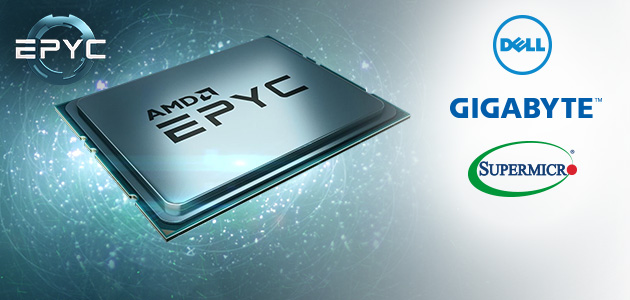WHERE TO BUY
ASBIS supplies a wide range of IT products to its customers all over UAE. To find out retail store near you visit ASBIS Resellers section
Other headlines

AMD Wins Another Cloud Provider With Baidu ABC Services
Advanced Micro Devices celebrated another victory in the cloud market

Chinese Artificial Intelligence (AI) and search giant Baidu announced the immediate availability of AI, big data and cloud computing (ABC) services based on single-socket servers powered by EPYC. This announcement follows Microsoft’s announcement last week that its new L-Series storage-optimized virtual machines would be powered by EPYC (see Patrick Moorhead’s coverage here). Additionally, Hewlett Packard Enterprise recently announced the availability of the ProLiant DL385 Gen10 server platform for virtualized infrastructure, powered by EPYC as well (also covered by Patrick Moorhead).
It was not entirely surprising that AMD secured Baidu as a customer—Baidu publicly announced support for EPYC at AMD’s launch event back in June. Still, this announcement demonstrates progress in AMD ’s quest to compete with Intel in the largest hyperscale datacenters.
The Details
While specifics around which EPYC system-on-a-chip (SoC) will be utilized have not been announced, Baidu’s use of single-socket provides a telling hint. The EPYC 7501 SoC is a 32-core part that has a variant specifically for single-socket use. This 180-Watt SoC delivers the following horsepower:
- 32 multi-threaded cores (64 threads)
- 2TB DDR4 RAM
- 8 Memory channels
- 128 lanes of PCIe3
180W may seem like a large power envelope for a processor, but when considering the workloads being supported, this deployment could be a case study in datacenter efficiency. AI, big data, and cloud computing services all thrive with larger memory footprints and more memory bandwidth. Additionally, workloads such as AI require GPU assistance for optimal performance. The EPYC 7501 provides the largest memory capacity, memory bandwidth, and PCIe of any x86 processor in the market, by a long shot. Baidu can deploy single-socket servers with the memory, storage, and GPUs to support the demands presented by AI, big data, and cloud services. Servers based on other CPUs would require two sockets to support these workloads, and that second CPU could run upwards of $3000 per server. Tack on a few hundred dollars more, when considering the cost of materials for a second socket in the server and additional power consumption. Multiply that by tens of thousands of servers, and the cost effectiveness becomes very real.
What this means
Anybody who watched AMD’s launch of EPYC walked away understanding the importance of cloud to AMD. This focus is reasonable as “cloud” will make up about 50% of server deployments over the next few years. The Baidu announcement demonstrates two things to me. First and foremost, AMD is successfully executing what appears to be a “cloud first” strategy. Six months after launch, and two of the largest cloud providers have deployed EPYC. Even though these customers undoubtedly tested pre-production silicon, this is an impressive achievement. My hunch tells me there will be more announcements.
Secondly, this announcement shows that cloud providers understand the value of the EPYC SoC. The datacenter architects at Microsoft Azure, Baidu, and elsewhere have the most intimate understanding of CPU performance: integer performance, performance per watt, performance per dollar, and performance per watt per dollar. When the team at Baidu selects EPYC for use in its datacenter, you can rest assured there is a price performance advantage at play. Enterprise IT organizations take note—cloud providers are validating EPYC.
In closing
Winning business with the big cloud providers is a significant achievement—seeing Baidu deploy ABC services on EPYC is another positive step for AMD. I look forward to seeing EPYC’s success in the traditional enterprise datacenters as well. Succeeding in the “volume” segments will ensure market viability when those cloud providers are buying fewer SoCs.
Disclosure: My firm, Moor Insights & Strategy, like all research and analyst firms, provides or has provided research, analysis, advising, and/or consulting to many high-tech companies in the industry, mentioned in this article, including Advanced Micro Devices, Hewlett Packard Enterprise, Microsoft, and Intel. I do not hold any equity positions with any companies cited in this column.
Server solutions powered by AMD EPYC from leading manufacturers Dell, Gigabyte, Supermicro already available from ASBIS.
Please, contact your ASBIS manager to get details or request the consultation.










